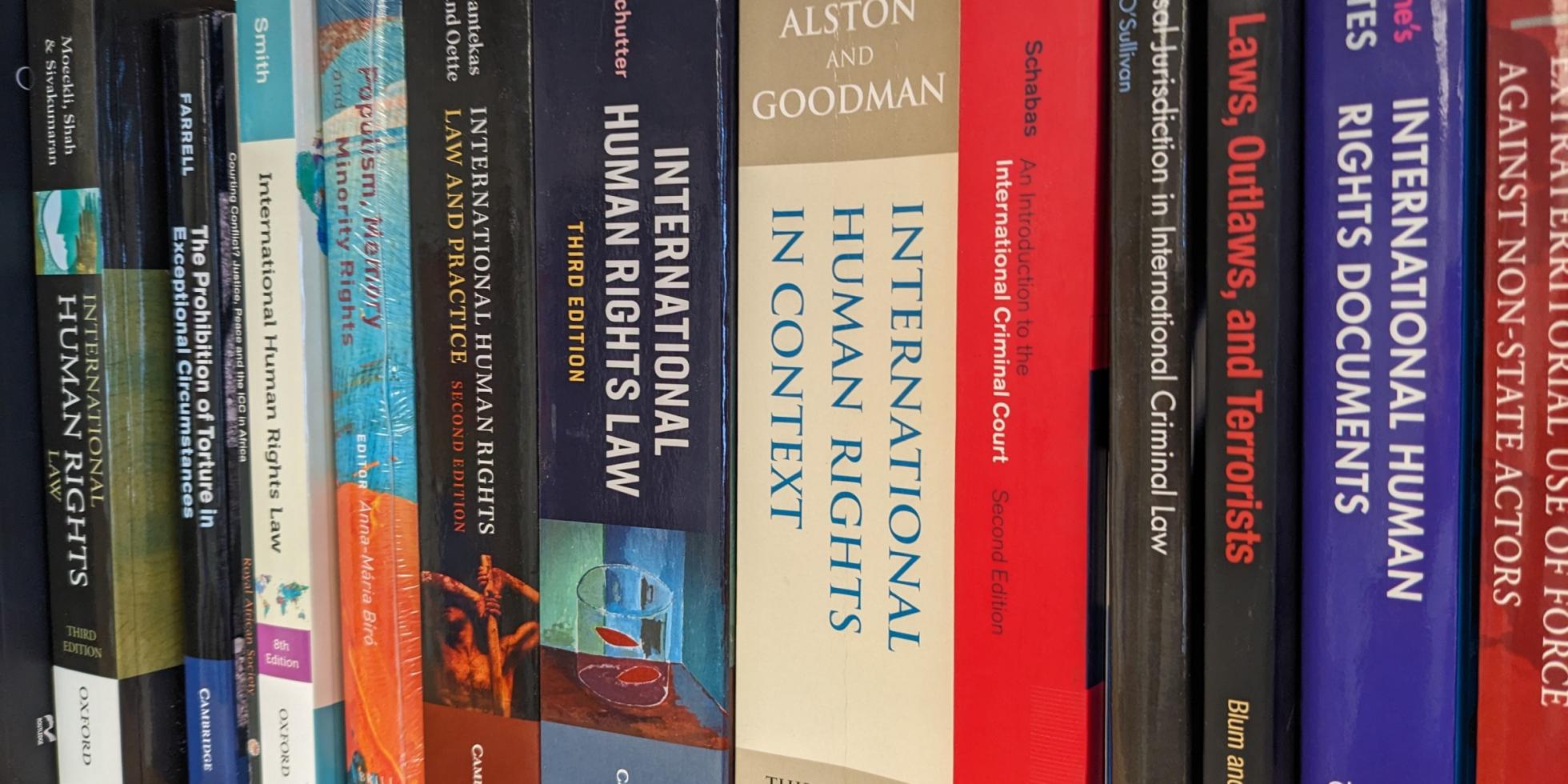The virtual human rights library brings together resources from multiple libraries and information services, both internal and external, to create an online hub dedicated to the study of human rights. This curation is unique in its interdisciplinary concerns and focuses on writings and research from social sciences, humanities, and law.
The virtual library is continually updated with the latest academic research in issue areas, as well as with relevant films, recorded conversations, and other forms of media.
Searchable Database
Click into the dropdowns to select the disciplines, keywords, and media type for your search, and then hit "Apply."
John Hagan, Wenona Rymond-Richmond "The Collective Dynamics of Racial Dehumanization and Genocidal Victimization in Darfur." American Sociological Review 73, no. 6 (2008): 875-902.
Sociologists empirically and theoretically neglect genocide. In this article, our critical collective framing perspective begins by focusing on state origins of race-based ideology in the mobilization and dehumanization leading to genocide. We elaborate this transformative dynamic by identifying racially driven...
Aliza Luft "The Moral Career of the Genocide Perpetrator: Cognition, Emotions, and Dehumanization as a Consequence, Not a Cause, of Violence." Sociological Theory (2023): 07352751231203716.
Scholars have long argued that dehumanization causes violence. However, others have recently argued that those who harm do so because they feel pressured or view violence as justified. Examining the Rwandan genocide, this article contends that contradictory theories of dehumanization...
Tracey Skillington "UN genocide commemoration, transnational scenes of mourning and the global project of learning from atrocity." The British Journal of Sociology 64, no. 3 (2013): 501-525.
This paper offers a critical analytic reconstruction of some of the main symbolic properties of annual UN Holocaust and Rwandan genocide commemorations since 2005. Applying a discourse‐historical approach (Wodak and Meyer 2010), it retraces how themes of guilt, responsibility, evil...
Nicole Fox, Hollie Nyseth Brehm "“I decided to save them”: Factors that shaped participation in rescue efforts during genocide in Rwanda." Social Forces 96, no. 4 (2018): 1625-1648.
Collective action scholars have long examined why people choose to participate in social movements. This article argues that this body of scholarship can be productively applied to understanding rescue efforts during genocide, which have typically been associated with altruism and...
Martha Minow Between Vengeance and Forgiveness: Facing History After Genocide and Mass Violence (Beacon Press, 1998)
With Between Vengeance and Forgiveness, Martha Minow, Harvard law professor and one of our most brilliant and humane legal minds, offers a landmark book on justice and healing after horrific violence. Remembering and forgetting, judging and forgiving, reconciling and avenging...
Ben Kiernan Blood and Soil: A World History of Genocide and Extermination from Sparta to Darfur (Yale University Press, 2009)
Kiernan examines outbreaks of mass violence from the classical era to the present, focusing on worldwide colonial exterminations and twentieth-century case studies including the Armenian genocide, the Nazi Holocaust, Stalin's mass murders, and the Cambodian and Rwandan genocides. He identifies...
Leshu Torchin Creating the Witness: Documenting Genocide on Film, Video, and the Internet (Minneapolis: University of Minnesota Press, 2012)
Creating the Witness examines the role of film and the Internet in creating virtual witnesses to genocide over the past one hundred years. Leshu Torchin’s broad survey of media and the social practices around it investigates the development of popular...
Geoffrey Robertson Crimes Against Humanity: The Struggle for Global Justice (New Press, 2013)
When it was first published in 1999, Crimes Against Humanity called for a radical shift from diplomacy to justice in international affairs. In vivid, non-legalese prose, leading human rights lawyer Geoffrey Robertson made a riveting case for holding political and military leaders...
Adam Rosenblatt Digging for the Disappeared: Forensic Science after Atrocity (Stanford University Press, 2015)
The mass graves from our long human history of genocide, massacres, and violent conflict form an underground map of atrocity that stretches across the planet's surface. In the past few decades, due to rapidly developing technologies and a powerful global...
Philippe Sands East West Street: On the Origins of "Genocide" and "Crimes Against Humanity" (Penguin Random House, 2017)
A profound and profoundly important book—a moving personal detective story, an uncovering of secret pasts, and a book that explores the creation and development of world-changing legal concepts that came about as a result of the unprecedented atrocities of Hitler’s...
Please Note:
While the Virtual Library is now live for use, we are still working to update its contents and improve its functionality.
It is usable by all visitors, but the hyperlinks to materials listed are for UChicago community members with a CNet ID and password.
Please direct feedback and suggestions to Kathleen Cavanaugh.
For technical assistance, email pozenhumanrights @ uchicago.edu.

